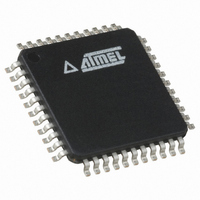ATMEGA164PA-AU Atmel, ATMEGA164PA-AU Datasheet - Page 201

ATMEGA164PA-AU
Manufacturer Part Number
ATMEGA164PA-AU
Description
MCU AVR 16KB FLASH 20MHZ 44TQFP
Manufacturer
Atmel
Series
AVR® ATmegar
Specifications of ATMEGA164PA-AU
Core Processor
AVR
Core Size
8-Bit
Speed
20MHz
Connectivity
I²C, SPI, UART/USART
Peripherals
Brown-out Detect/Reset, POR, PWM, WDT
Number Of I /o
32
Program Memory Size
16KB (8K x 16)
Program Memory Type
FLASH
Eeprom Size
512 x 8
Ram Size
1K x 8
Voltage - Supply (vcc/vdd)
1.8 V ~ 5.5 V
Data Converters
A/D 8x10b
Oscillator Type
Internal
Operating Temperature
-40°C ~ 85°C
Package / Case
44-TQFP, 44-VQFP
Cpu Family
ATmega
Device Core
AVR
Device Core Size
8b
Frequency (max)
20MHz
Interface Type
2-Wire/SPI/USART
Total Internal Ram Size
1KB
# I/os (max)
32
Number Of Timers - General Purpose
3
Operating Supply Voltage (typ)
2.5/3.3/5V
Operating Supply Voltage (max)
5.5V
Operating Supply Voltage (min)
1.8V
On-chip Adc
8-chx10-bit
Instruction Set Architecture
RISC
Operating Temp Range
-40C to 85C
Operating Temperature Classification
Industrial
Mounting
Surface Mount
Pin Count
44
Package Type
TQFP
Package
44TQFP
Family Name
ATmega
Maximum Speed
20 MHz
Operating Supply Voltage
2.5|3.3|5 V
Data Bus Width
8 Bit
Number Of Programmable I/os
32
Number Of Timers
3
Lead Free Status / RoHS Status
Lead free / RoHS Compliant
Available stocks
Company
Part Number
Manufacturer
Quantity
Price
- Current page: 201 of 581
- Download datasheet (27Mb)
19.5.1
8272A–AVR–01/10
USART MSPIM Initialization
The UDORDn bit in UCSRnC sets the frame format used by the USART in MSPIM mode. The
Receiver and Transmitter use the same setting. Note that changing the setting of any of these
bits will corrupt all ongoing communication for both the Receiver and Transmitter.
16-bit data transfer can be achieved by writing two data bytes to UDRn. A UART transmit com-
plete interrupt will then signal that the 16-bit value has been shifted out.
The USART in MSPIM mode has to be initialized before any communication can take place. The
initialization process normally consists of setting the baud rate, setting master mode of operation
(by setting DDR_XCKn to one), setting frame format and enabling the Transmitter and the
Receiver. Only the transmitter can operate independently. For interrupt driven USART opera-
tion, the Global Interrupt Flag should be cleared (and thus interrupts globally disabled) when
doing the initialization.
Note:
Before doing a re-initialization with changed baud rate, data mode, or frame format, be sure that
there is no ongoing transmissions during the period the registers are changed. The TXCn Flag
can be used to check that the Transmitter has completed all transfers, and the RXCn Flag can
be used to check that there are no unread data in the receive buffer. Note that the TXCn Flag
must be cleared before each transmission (before UDRn is written) if it is used for this purpose.
The following simple USART initialization code examples show one assembly and one C func-
tion that are equal in functionality. The examples assume polling (no interrupts enabled). The
baud rate is given as a function parameter. For the assembly code, the baud rate parameter is
assumed to be stored in the r17:r16 registers.
164A/164PA/324A/324PA/644A/644PA/1284/1284P
To ensure immediate initialization of the XCKn output the baud-rate register (UBRRn) must be
zero at the time the transmitter is enabled. Contrary to the normal mode USART operation the
UBRRn must then be written to the desired value after the transmitter is enabled, but before the
first transmission is started. Setting UBRRn to zero before enabling the transmitter is not neces-
sary if the initialization is done immediately after a reset since UBRRn is reset to zero.
201
Related parts for ATMEGA164PA-AU
Image
Part Number
Description
Manufacturer
Datasheet
Request
R

Part Number:
Description:
8-bit Microcontroller With 16/32/64k Bytes In-system Programmable Flash - Atmel Corporation
Manufacturer:
ATMEL Corporation
Datasheet:

Part Number:
Description:
8-bit Microcontroller with 16/32/64K Bytes In-System Programmable Flash
Manufacturer:
ATMEL [ATMEL Corporation]
Datasheet:

Part Number:
Description:
Manufacturer:
Atmel Corporation
Datasheet:

Part Number:
Description:
IC AVR MCU 16K 16MHZ 5V 44TQFP
Manufacturer:
Atmel
Datasheet:

Part Number:
Description:
IC AVR MCU 16K 16MHZ 5V 44-QFN
Manufacturer:
Atmel
Datasheet:

Part Number:
Description:
IC AVR MCU 16K 16MHZ 5V 40DIP
Manufacturer:
Atmel
Datasheet:

Part Number:
Description:
MCU AVR 16K FLASH 16MHZ 44-QFN
Manufacturer:
Atmel
Datasheet:

Part Number:
Description:
IC AVR MCU 16K 16MHZ COM 40-DIP
Manufacturer:
Atmel
Datasheet:

Part Number:
Description:
IC AVR MCU 16K 16MHZ COM 44-QFN
Manufacturer:
Atmel
Datasheet:

Part Number:
Description:
IC AVR MCU 16K 16MHZ IND 40-DIP
Manufacturer:
Atmel
Datasheet:

Part Number:
Description:
IC AVR MCU 16K 16MHZ IND 44-QFN
Manufacturer:
Atmel
Datasheet:

Part Number:
Description:
IC AVR MCU 16K 16MHZ IND 44-TQFP
Manufacturer:
Atmel
Datasheet:

Part Number:
Description:
IC MCU 8BIT 16KB FLASH 44TQFP
Manufacturer:
Atmel
Datasheet:

Part Number:
Description:
MCU AVR 16K FLASH 16MHZ 44-TQFP
Manufacturer:
Atmel
Datasheet:











